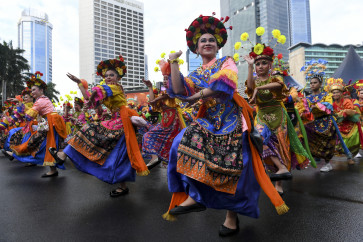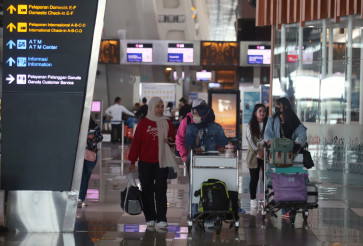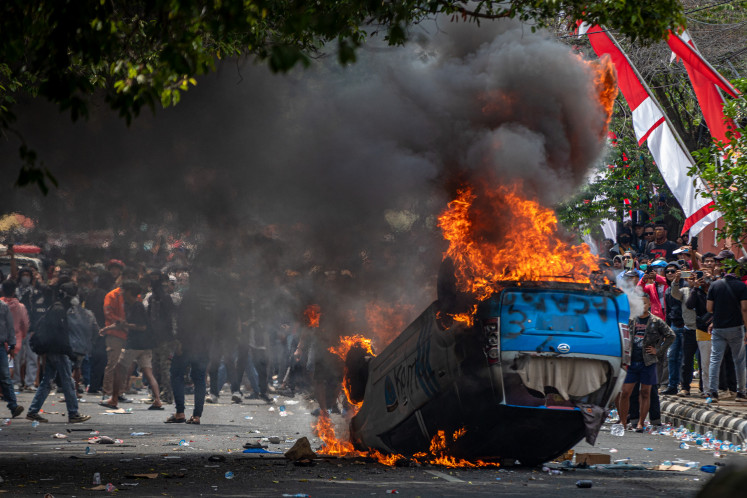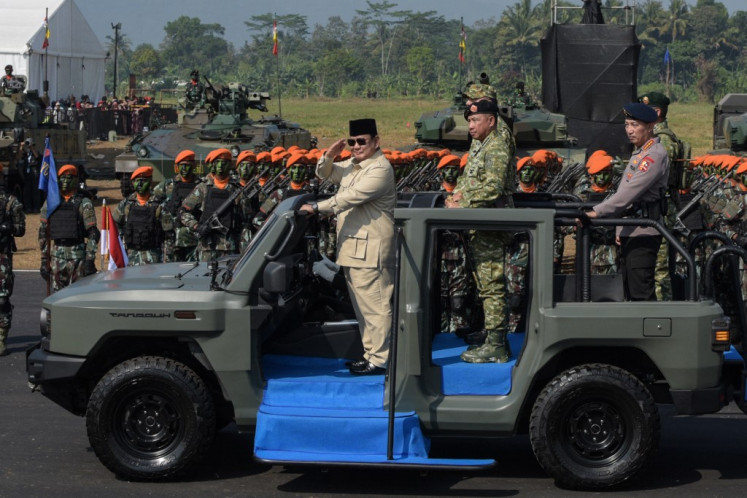Popular Reads
Top Results
Can't find what you're looking for?
View all search resultsPopular Reads
Top Results
Can't find what you're looking for?
View all search resultsInsight: Why do retired officers run for local office?
Indonesia is set to go through its third round of simultaneous direct local elections, which will take place on June 27 in 171 regions (17 provinces, 39 cities and 115 regencies)
Change text size
Gift Premium Articles
to Anyone
I
ndonesia is set to go through its third round of simultaneous direct local elections, which will take place on June 27 in 171 regions (17 provinces, 39 cities and 115 regencies).
There are many concerns over the upcoming elections, ranging from the number of corruption cases plaguing candidates to the potential political and social schisms over identity politics. However, many are more worried about the growing number of retired officers (military and police) running in these local elections.
In North Sumatra, for example, former Army Strategic Reserve Command (Kostrad) chief Edy Rahmayadi is a governor candidate backed by three major parties. Overall, 18 military and police retirees are running,whether as the top or deputy candidate, accounting for less than 2 percent of the total candidates.
Since the inception of direct local elections in 2015, most of the retirees running for political office have lost. In 2015, of 26 retirees running only seven won, and last year 13 joined the race but only five won. Only a third of retirees have won since 2015 (constituting less than 4 percent of the total 305 local elections over the past three years).
These figures should give us caution about sweeping concerns that the Indonesian Military (TNI) is getting back into New Order-era politics through local offices. But analysts are still concerned about the erosion of the military’s political neutrality if more retirees enter politics, especially if they openly negotiate with parties before they retire. Others are concerned that the retirees will promote the TNI’s interests or potentially misuse the territorial command structure for local political purposes.
Arie Soesilo notes in Jurnal Sosiologi Masyarakat (2014), however, that while retirees enter politics for either idealistic (e.g. public service) or pragmatic reasons (e.g. employment), nearly all do so without specific organizational instructions or guidance from the TNI. We should not assume therefore that retired officers in politics will always be driven by the corporate interests of the TNI or police, above those of the personal or political party.
But if that is the case, and given their poor electoral prospects, why do retired officers continue to run for local office?
For one thing, civilian politicians and parties continue to reel them in, believing that retirees might be popular candidates and/or have the political and economic network to boost political mobilization. Some have been brought in to strengthen political party organization and help the party’s “intelligence” operations. Party officials also see retirees as “short cuts” to boosting party profiles without spending resources on publicity campaigns.
Some parties, however, are more likely to recruit and nominate retired officers than others. Faishal Aminuddin notes in Journal of Current Southeast Asian Affairs (2017) that between 1998 and 2014, most retirees joining parties (over 200 of them) joined the Democratic Party or Hanura Party. Since 2015, the top six parties to endorse tickets with at least one retiree in it have been: the Democrats, Hanura, Nasdem, Gerindra, the Indonesian Democratic Party of Struggle (PDI-P) and the National Mandate Party (PAN).
The fact that parties still find a ready pool of politically savvy retirees suggests the enduring legacy of authoritarian rule.
First, many retirees who enter politics were officers trained and groomed under the New Order. For over three decades, they were expected to manage various civilian positions across the country and even “secure” electoral victories for the regime. Many of them, particularly from the Army, were also valued for their ability to build personal networks across local political and business elites.
As such, there are plenty of politically savvy retirees. In the early post-authoritarian era, most of the politically active retirees came from the military academy generations of the late 1960s and mid-1970s. But retirees from the late 1970s and early 1980s have entered politics in recent years too. If parties continue to recruit retirees, we might have to wait for another few decades before New Order-era officers no longer provide a steady pool of politically savvy retirees.
Second, the TNI’s New Order-era organizational structure and policies — from education and training to personnel management — are still intact today. This is partly because most of the efforts to reform the TNI post-1998 were focused on dismantling the TNI’s official political roles and building democratic civil-military relations rather than organizational transformation.
The lack of an overhaul of education and training means there are very few professional development and educational opportunities for TNI officers to prepare them for a non-political second career.
The uncertainty surrounding promotions leading to logjams and internal frustration has exacerbated this problem. These trends might explain why we have seen at least 33 mid-ranking military and police officers (captains to colonels) taking early retirement to run for local office since 2015.
Taken together, the party demand, the enduring legacies of the New Order, and the lack of progress on organizational reform have contributed to the persistent entrance of retirees into the political arena, although their electoral prospects are not likely to improve anytime soon. But as the old saying goes, old soldiers never die, they only fade away.
_______________________
The writer is a senior researcher at the Centre for Strategic and International Studies (CSIS) in Jakarta and currently a visiting fellow at the National Bureau of Asian Research in Seattle, Washington.










